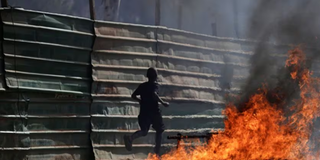Explainer: What is happening in Senegal and could tensions escalate?

A boy runs past barricades as Senegalese demonstrators clash with riot police during a protest against the postponement of the Feb. 25 presidential election, in Dakar, Senegal February 4, 2024.
What you need to know:
- The postponement of Senegal's presidential election from Feb. 25 to December 15 has been ruled unconstitutional.
- The authorities are under pressure to schedule the vote to be held as soon as possible before President Macky Sall's term ends on April 2.
The postponement of Senegal's presidential election from Feb. 25 to Dec. 15 has been ruled unconstitutional and the authorities are under pressure to schedule the vote to be held as soon as possible before President Macky Sall's term ends on April 2.
Any pushback against the constitutional council's ruling would risk more unrest. The electoral crisis has already led to violent protests and warnings of authoritarian overreach in one of coup-hit West Africa's more stable democracies.
WHY DID PRESIDENT MACKY SALL CALL FOR A POSTPONEMENT?
Sall, 62, who is not standing for re-election and has reached the constitutional limit of two terms in power, said he delayed the poll due to a dispute over the candidate list and alleged corruption within the constitutional council that approved it.
"These troubled conditions could seriously undermine the credibility of the ballot by sowing the seeds of pre- and post-electoral disputes," he said in a surprise speech to the nation hours before official campaigning was meant to start on Feb. 4.
The opposition Senegalese Democratic Party (PDS), whose candidate was excluded from the final list because of dual nationality issues, supported the delay and proposed a postponement bill in parliament before Sall's address.
WHAT DO HIS OPPONENTS SAY?
Other opposition and civil society groups have angrily rejected the postponement, with some accusing Sall of orchestrating an "institutional coup" to extend his tenure.
Several of the 20 presidential candidates and a group of opposition lawmakers filed legal challenges to the delay to the constitutional council.
WHY IS THE DELAY SIGNIFICANT?
Senegal has never delayed a presidential vote. Its four largely peaceful transitions of power via the ballot box since independence from France in 1960 have built up its reputation as one of West Africa's strongest democracies.
The abrupt postponement has dismayed those who believed Senegal would stick to a standard electoral course that has become increasingly uncommon in West Africa, where military takeovers and constitutional manoeuvring have forced democracy into retreat in many countries in recent years.
WHAT HAPPENS NEXT?
The West African political and economic bloc the Economic Community of West African States, several opposition leaders and western partners, have called on the authorities to accept the constitutional council's ruling that the postponement was unlawful.
In its decision, the council requested the authorities hold the election as soon as possible. President Sall has to issue a decree setting a new date for the election. The presidency and government have not yet confirmed they will comply.





